Living in a smaller home can make your money life better. Think of it like wearing a cozy sweater that fits just right. You pay less each month for things like power and water. The taxes are lower too. When stuff breaks, it costs less to fix. This means you have more money to save or spend on fun times with your family.
A smaller home helps you buy less stuff too. You pick only what you really need. Your family spends more time close to each other. Best of all, when you pay less for your home each month, you can save more money for later. This makes life easier and less worrying.
You don't need a big house to be happy. Sometimes, the best things come in small homes.
Ready to start building equity in your own Michigan home? Get your personalized home loan quote today.
The True Cost of Excess Space

Living in a big house costs more than you think. When you have extra rooms you don't use, you still pay for them. You pay to heat them in winter. You pay to cool them in summer. You must clean them and fix things that break.
Empty rooms can fill up fast with stuff you buy but don't need. Soon you spend more money on new chairs, tables, and boxes to store things. Each month, you give away money for these unused spaces.
Many people find they're happier in smaller homes. They save money and can spend it on fun trips or save it for later.
Your home should fit your life, not make it harder.
Michigan residents, unlock the door to your new home. Request your home loan quote from Treeside Financial today.
Hidden Expenses of Large Homes
Big homes can cost you more money than you think. Let's look at what you need to know about these extra costs.
When you buy a big house, you pay more than just the price tag. Many costs pop up that can empty your wallet.
Here's what costs more in a big house:
- Air conditioning and heating fixes: $400-800 each year
- House insurance: About a third more than small homes
- Taxes on the house: $2,000-5,000 more each year
- Power and water bills: Almost half more than small homes
You also spend more on:
- Cleaning stuff
- New parts for the house
- Fixing things that break
Think about it: A bigger house means more space to clean, more lights to change, and more rooms to fix.
Even small jobs like changing air filters cost more because you need more of them.
Every inch of extra space adds to your bills. When you paint walls or put in new carpet, you pay more because there's more to cover.
Lifestyle Benefits of Downsizing
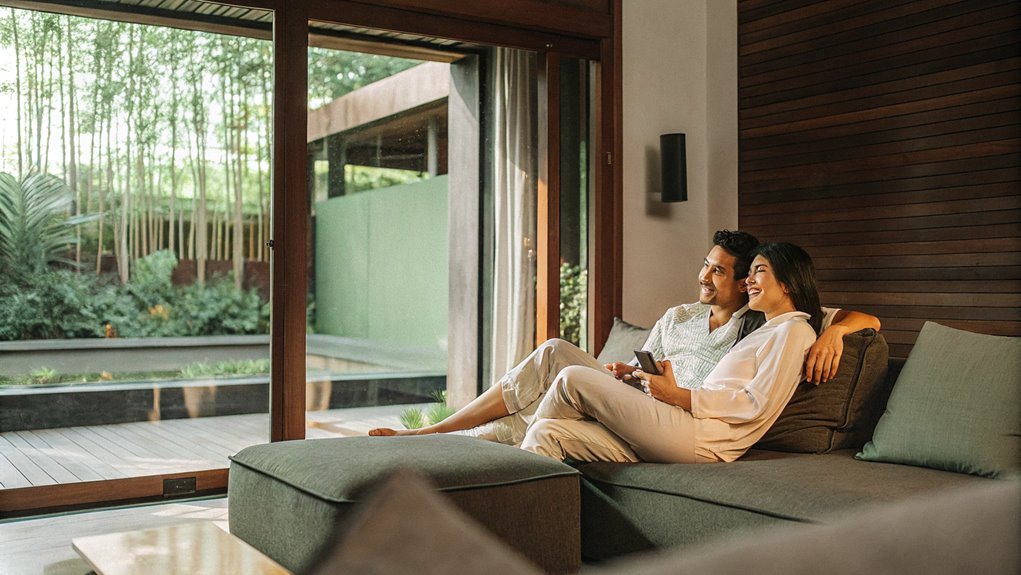
Moving to a smaller home can make your life better and richer. You won't have to clean as much. You won't need to fix as many things. This gives you more time to do fun stuff and be with people you love.
When you have less space, you buy less stuff. This helps you care about what's real.
Many people like living in smaller homes. They feel less worried. They enjoy life more. They can spend time doing fun things instead of taking care of lots of stuff.
A small home is better for the Earth too. You can travel more and do things when you want. Living in a cozy home helps families stay close. People find joy in this simple way of life.
Building Long-Term Wealth Through Simplicity
Living in a smaller home helps you save more money. You won't need as much cash for a down payment, so you can use that extra money to grow your wealth.
You can put the money you save into things like retirement plans and stocks. Over time, this can make you more money than if you bought a big house.
Small homes also cost less to fix and take care of. This means you'll have more money left each month to invest and watch your savings grow bigger and bigger.
Smaller Down Payment Benefits
Putting less money down on a simple home can help you grow your money better. Think of it like not putting all your eggs in one basket. When you save some of your money, you can use it for other things that help you earn more.
A cheaper home means you pay less each month. This lets you put money in other places like your work savings or the stock market. When you spread your money around, you stay safer if one thing goes wrong.
You also have extra money saved for when you need it. Many smart people know that having money in different places helps them grow their savings better than just buying a big house.
Smart Reinvestment Growth Strategy
Living in a smaller home helps you save more money. This is a smart way to start building your wealth. You can put the extra money you save into different kinds of investments.
Think of your money like seeds you can plant in many places. You can buy low-cost funds that track the stock market. You can also buy stocks that pay you money every few months. Some people put money into safe bonds too.
When you keep your home costs low, you have more cash ready to use. This is better than having all your money stuck in your house. Many rich people got that way by saving and investing their money, not by buying big homes.
Money that you invest can grow and make more money over time. The more you can invest now, the more it can grow later. This is how you can build your wealth step by step.
Lower Maintenance Costs Matter
Your smaller home will cost less to take care of. You'll pay much less to fix the roof, paint the walls, and keep the heating system running well. Tasks like cleaning gutters are easier too when your house is smaller.
Let's look at the numbers in a simple way. Big homes need more money for fixes each year.
If you move from a big $500,000 house to a smaller $300,000 house, you could save up to $8,000 every year on repairs. Think of what you could do with that extra money! You could save it for fun trips or put it away for when you retire.
When you spend less time and money fixing your house, you can enjoy life more. That's what having a smaller home can do for you.
Lower Bills, Bigger Savings

Living in a smaller home helps you keep more money in your pocket. Each month, you spend less on basic home costs. You save on power bills, home insurance, and taxes.
Let's look at what you can save:
| Expense Type | Large Home | Small Home |
|---|---|---|
| Utilities | $350/month | $175/month |
| Insurance | $200/month | $125/month |
| Property Tax | $600/month | $350/month |
| Maintenance | $300/month | $150/month |
| HVAC Service | $150/month | $75/month |
Think about what you could do with all that extra money! Many people who moved to smaller homes now have more cash to spend. They can save more for fun things or put it away for when they retire. Some use it to travel or help their kids.
Making your home smaller is a smart way to take charge of your money. You get to choose what to do with the savings, and that feels great!
Time Freedom Through Minimal Living
Your home becomes your friend when it's small and simple. You won't waste time cleaning big rooms you never use. A smaller home means less time fixing things and less yard work to do. This gives you more time to do what you love.
Many people find that owning less stuff makes them feel free. When you don't have to fix your house all weekend, you can play with your kids or learn something new.
A small home helps your mind feel calm and clear. You won't feel stuck at home doing chores. You can take trips and have fun when you want to.
Environmental Impact of Home Size
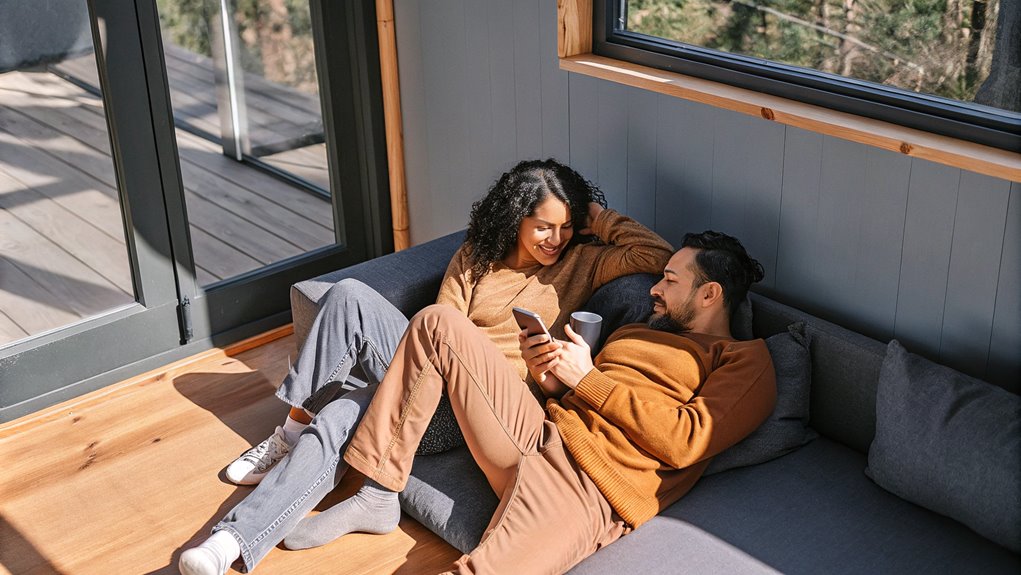
Living in a small home helps our Earth stay healthy. Small homes need less power to stay warm in winter and cool in summer. This means they make less pollution than big homes. Small homes also need fewer materials to build.
Many people who care about nature live in small homes. When you have a small home, you buy less stuff. This means less trash goes to dumps. You also need less soap to clean and less furniture to fill the rooms. Each thing we buy affects nature in some way.
Smart Design in Small Spaces
Living in a small home means getting creative! You can make your space work better by using smart furniture. A table that folds down when you need it helps save room. A couch that turns into a bed gives you two pieces in one.
Look up! Your walls are like gold. Put shelves high up and use tall cabinets to store your things. This keeps your floor clear so you can move around.
Want your home to feel bigger? Hang up some mirrors! They make rooms look twice as big.
Keep your windows clean and clear too. The sunshine will make your small home feel bright and open.
Multi-Purpose Furniture Solutions
Your home can feel bigger when you pick furniture that does more than one thing. Think of a footstool that opens up to store blankets inside. Or a bed that folds into the wall and turns into a desk. These smart pieces help keep your home neat and tidy.
Look for sofas that can split apart when you need them to. Get tables that move up and down to help you work. Keep chairs that stack on top of each other. Small desks can fold flat on the wall. Little tables can fit under big ones.
When you pick furniture that works hard, your home works better too. It helps you live with less stuff and makes your day easier.
Vertical Storage Maximizes Space
Your walls can help you store more stuff at home. When you live in a small place, using your walls smartly gives you more room to move around. You can add tall shelves, hooks, and boxes on your walls to keep things off the floor.
Try these easy ways to use your walls:
- Put up shelves that move up and down so you can fit different items as you need them.
- Add hooks on your doors to hang coats, bags, and cleaning tools.
- Put up shelves that go side to side like a snake to make your room look cool while holding your books and things you use every day.
The best part is that you won't trip over stuff on the floor anymore. You can walk around freely and still keep all your things neat and tidy on the walls.
Natural Light Flow Tricks
Let's make your home feel bigger with sunlight! When you put mirrors across from your windows, the light bounces deeper into your rooms.
Take down thick curtains and use thin ones instead. This lets more sun shine in.
Use light colors on your walls to make them bright. When you paint, pick shiny paint that makes light bounce around.
Put glass doors in your home so light can move from room to room. Shiny things like glass tables and metal pieces help spread light too.
If you can, take down walls you don't need.
Or put in glass walls to keep spaces private while letting light flow through your home.
Investment Opportunities After Downsizing
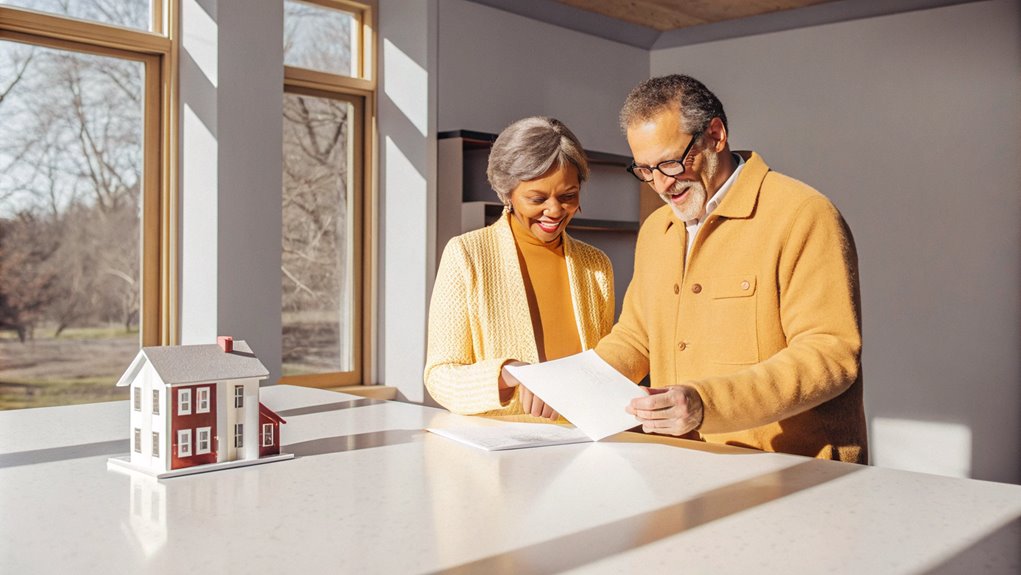
Moving to a smaller home can put more money in your pocket. This money can help you grow your wealth in new ways.
Here are good ways to use your extra money:
- Put some money in simple stock funds that pay you back over time.
- Buy homes to rent out in up-and-coming areas where you can make money each month.
- Use the money to start your own small shop or store.
When you move to a smaller home, you do more than just save space. You open up new ways to make money work for you.
Happiness Research and Housing
Living in a small home can make people happier and less worried. Many families find they grow closer when they share a cozy space. In a small home, people talk more and spend better time together.
When family members live in smaller spaces, they bond more. They play games, tell stories, and make memories together.
A small home means less cleaning and less work to take care of it. This gives people more time to do fun things they love.
A small home also costs less money. When people spend less on their home, they worry less about bills. This helps them feel more at peace and enjoy life more.
Property Tax Advantages

You'll save money on taxes when you buy a small home.
The less space your home takes up, the less you pay in taxes each year. When home values go up or down in your area, the change won't hit your wallet as hard.
Plus, small homes often get tax breaks that make your bills even lower.
Lower Annual Tax Bills
Living in a smaller home means paying less in taxes each year. When you pick a cozy home instead of a big one, you'll pay less money to your town or city for property taxes. Your tax bill goes down because smaller homes cost less and take up less space.
Think about what you can do with the money you save:
- Save $1,000 or more each year on taxes
- Put the extra money in your bank for later
- Know what to expect in bills each month
Small homes are a smart choice if you live where taxes are high. The money you keep can help pay for other things you need or want.
Small homes also keep their value well over time. This means your taxes won't jump up and down like they might with bigger, fancier houses. You can better plan your budget when you know what to expect.
Reduced Assessment Value Impacts
Small homes get lower tax bills because they are worth less money. This helps you save more each year.
When tax people look at your home, they check these things:
- How big your house is
- How much land you have
- How old your house is
- What nearby homes cost
- What the market says it's worth
Small homes cost less when prices go up or down. You pay less tax than big home owners do. This means you can plan better and save more money. Small homes make it easier to keep up with bills when taxes rise in your area.
| What They Look At | How It Helps You |
|---|---|
| House Size | Lower value |
| Land Size | Less tax |
| House Age | Less cost |
| Other Homes | Better prices |
| Market Price | Smaller changes |
Simplified Exemption Qualifications
Your smaller home can help you save on taxes more easily. Many places give tax breaks to people with regular-sized homes. You won't have to fill out as many forms or wait as long to get your tax savings.
You can get tax help in three ways:
- A homestead break that most homes can get
- Special savings if you're older
- Tax help in some areas based on your income
With a smaller home, you can spend less time doing paperwork. Instead, you can enjoy the money you save on your taxes.
Less Space, More Experiences
You can live better in a small home. When you spend less money on a big house, you can use that money to do fun things. You can travel, try new hobbies, and spend more time with your family.
A small home helps you buy less stuff. You only keep what you need. You pay less for power and fixes. Each month, you save money that you can use for fun trips.
You won't spend all weekend cleaning a big house. Instead, you can go out and do things you love.
People who pick small homes over big ones are often happy they did. They make better memories with family. They grow as people. They spend money on doing things, not just having things.
Maintenance Cost Comparisons
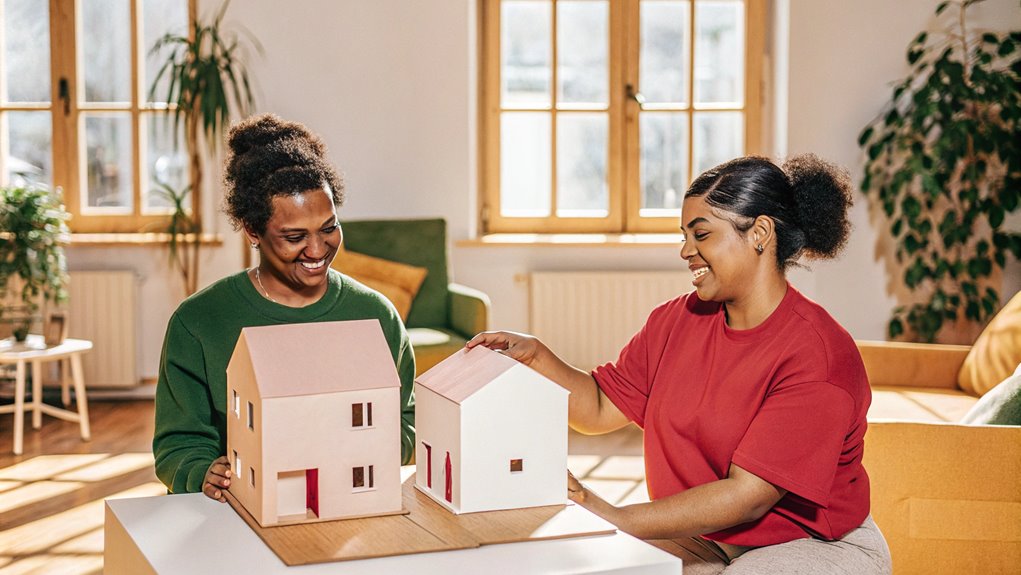
Think of your home like a toy – bigger toys need more care than smaller ones! When you live in a smaller home, you save money on fixing things. Taking care of a big 3,000 square foot house costs twice as much as a home half that size.
Ways you save money in a small home:
- Less stuff breaks – fewer windows, floors, and lights to fix
- Lower power bills – less room to keep warm or cool
- Less cleaning work – tiny spaces need less soap and time to clean
Each year you keep living in a small home, your wallet gets a bit fatter. You can use this extra money for fun things or save it for later.
Time shows us that small homes are easier on our bank accounts. They let us keep more of our hard-earned money to spend on things we care about.
Debt-Free Living Through Housing Choices
Living in a smaller home can help you become debt-free. Think of your friend who bought a tiny house and now has no house payments at all. When you pick a home that costs less, you can pay it off much faster.
The money you save each month can go straight to paying off your home. Many of your neighbors may have big homes, but they also have big bills to pay each month.
A small home that fits your needs is smart. You could pay off a cozy home in 15 years instead of 30.
When you own your home with no debt, you can do fun things like go on trips or save more money. People who still owe money on big homes can't do these things as easily.
Best of all, you'll sleep better at night knowing you made a good choice. No more worrying about big house payments!
Location Over Square Footage
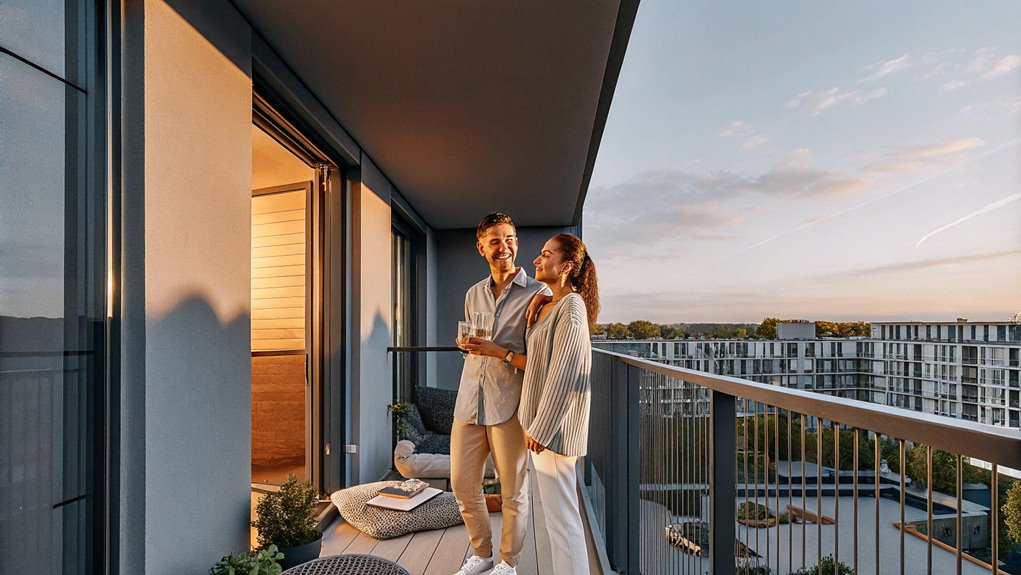
Living in a smaller home in a great spot is better than having a big house far away. The right location helps your home grow in value and makes life more fun.
A good spot means:
- Less driving to work and school
- Easy walks to stores and parks
- Quick trips to fun places
When you pick where to live, think about what you do every day. Being close to things you love is worth more than having extra rooms you don't need.
Good spots near your job and favorite places help you:
- Save time
- See friends more
- Get to parks and shops fast
- Have more fun in your city
Pick a home in the right spot, even if it's smaller. A good location is worth more than big empty rooms.







